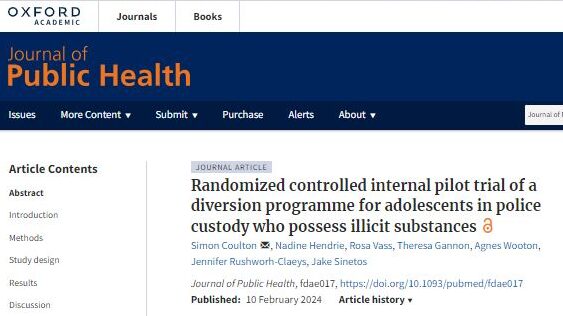Professor Simon Coulton, S.Coulton@kent.ac.uk

Funding: Youth Endowment Fund 'Another Chance' stream £964,513
This study follows on from the completed NIHR Public Health Research funded study, RISKIT-CJS, to reduce substance use among adolescents in the Criminal Justice System.
Read the pilot study report (clickable image)
The RCT will evaluate the effectiveness of Re-frame, a ‘Diversion Programme’ which takes a novel approach to dealing with young people who come to the attention of police and found to be in possession of Class B/C illicit substances. Rather than formally charge young people, the police can refer them to help to manage their substance use and avoid the negative impact of criminalisation. Framed around a contextual safeguarding approach, Re-frame sessions give young people a chance to reflect on how their actions have affected their lives, family and community. It aims to build self-confidence and increase motivation to reduce substance use. Young people who meet eligibility criteria and give consent, are randomised to receive either Re-frame or ‘care as usual’. They complete questionnaires exploring substance use, physical and mental health, and wellbeing at baseline, before their treatment is chosen, and six months later to follow progress.
Re-frame is delivered by We Are with You across Kent, Sefton, Wigan and Cornwall. The study is the first time a Police-led drug diversion scheme has been evaluated in the UK using a scientifically rigorous RCT. The Re-frame RCT trial evaluation will address whether this novel approach to managing these young people is more effective than usual care in reducing substance use, offending behaviour and improving overall wellbeing.

Aims of Re-frame Evaluation:
- Enhance a young person’s knowledge of substance use and links with physical and mental health and behaviour
- Explore impact of substance use on the young person, family and social network
- Evaluate whether Re-frame is an effective approach for young people in reducing substance use and offending and improving wellbeing
- Find out if Re-frame works, for whom, in what ways and in what context?
- Assess whether Re-Frame is an acceptable approach from the perspectives of all involved including young people, police and the service provider
- Explore the psychological mechanisms associated with changes
CHSS Research Fellow Nadine Hendrie, Trial Manager said, ‘We need robust evidence around diversion programmes aiming to steer young people away from criminalisation. We are excited to be carrying out the first RCT in the UK, of this type of programme. The Re-frame evaluation will show us whether this novel approach works to reduce offending and future criminalisation among this vulnerable group’.
Involving and engaging with young people
A Young People’s Advisory Group has been set up to ensure young people have an active voice in the project. They will assess trial information provided to young people and data collection instruments and offer recommendations for improvement. They will attend trial management meetings throughout the project.

